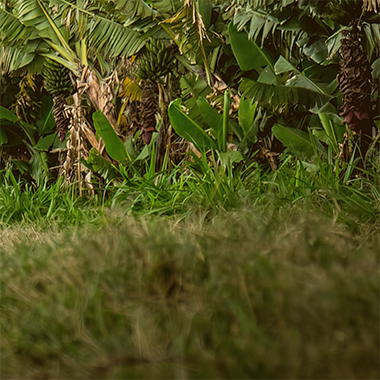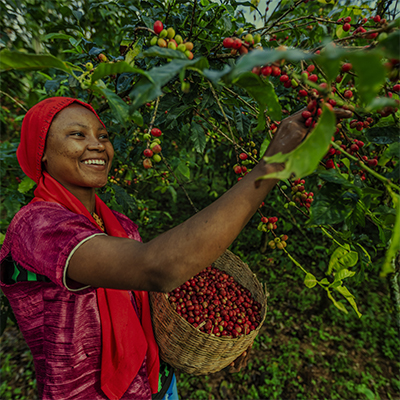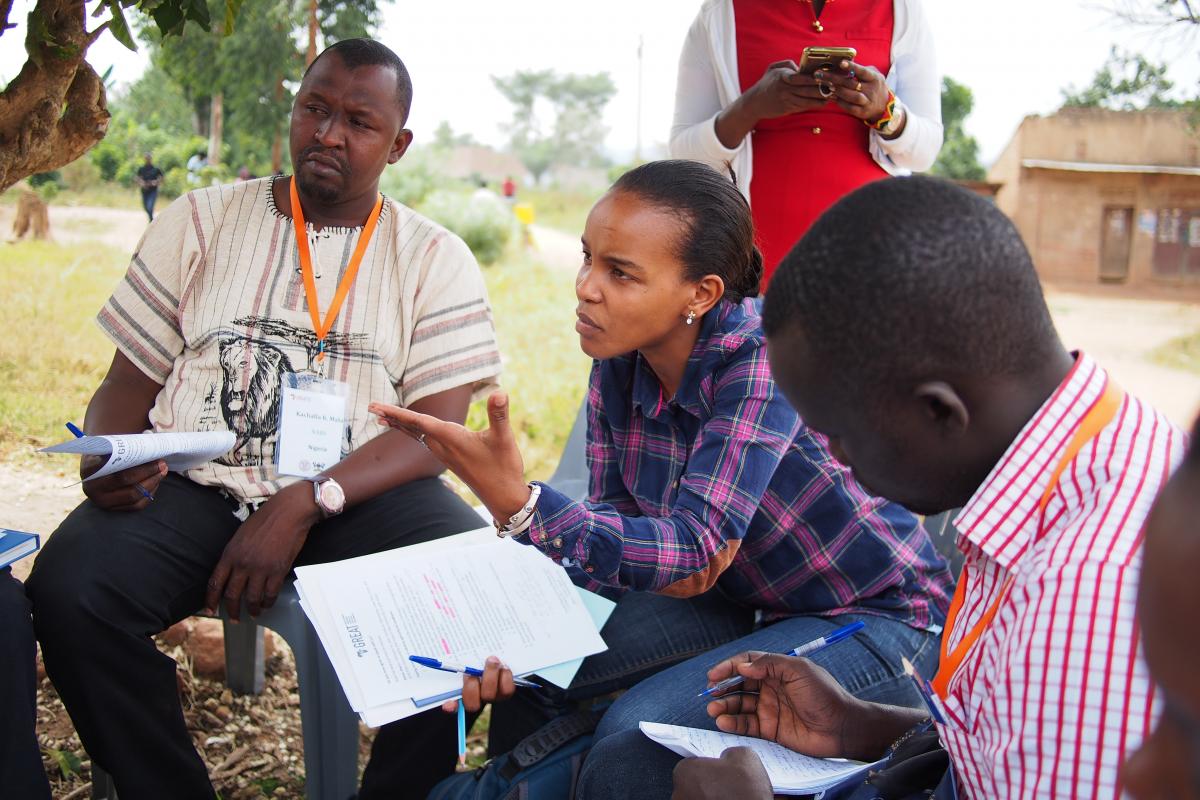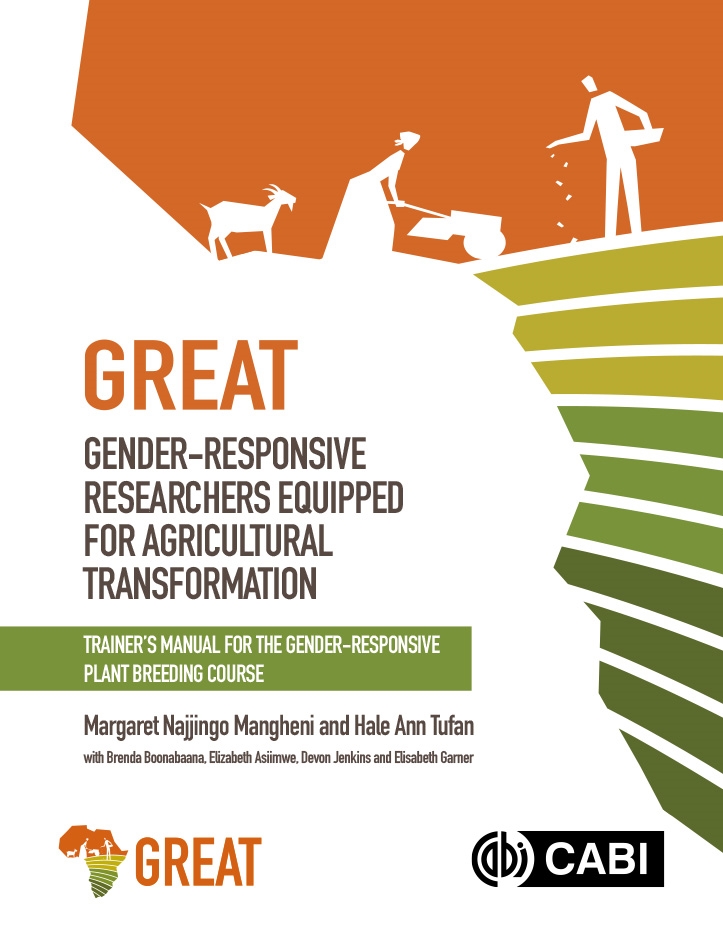GREAT equips researchers to create more inclusive and effective agricultural systems by addressing the priorities of both women and men in sub-Saharan Africa and South Asia. Research from our Community of Practice is aimed at deepening gender responsive and transformative research across Africa and beyond.
Leading agricultural transformation.


RESEARCH CLUSTERS
With the goal of deepening the gender-responsive agricultural research skills of NARs in Sub-Saharan Africa, GREAT funded five teams, or research clusters, to conduct research in Ghana, Uganda, Nigeria and Zimbabwe.
Women’s Empowerment, Masculinities & Social Norms
This research cluster is conducting research in Uganda on how women’s empowerment and masculinities have been conceptualized in agriculture, research and development interventions. This team is also looking at what social and gender norms influence women’s empowerment and disempowerment in the agri-food system in Uganda. This team is led by researchers at Makerere University: Margaret Najjingo Mangheni, Amon Mwiine, Losira Nasirumbi Sanya, Richard Miiro and GREAT fellows Grace Nanyonjo, Brenda Nakyewa, Martha Busingye, Fred Shimali, and Stephen Angudubo.
Piloting the G+ Tools in the Groundnut Value Chain
This research team in Uganda is working on documenting the gendered trait preferences along the groundnut value chain and developing a groundnut product profile using the G+ tool. This research is being conducted by the National Semi-Arid Resources Research Institute (NaSARRI) in Uganda: Eileen Nchanji, David Okello Kalule, Stephen Angudubo, Bernard Sakyiamah, Hellen Opie and Esuma Williams.
Piloting the G + Tools for the Rice Value Chain in Ghana
This team aims to develop a product profile for rice using the G+ tools and will compare this against an earlier rice product profile that also took the needs of women into consideration. This research is being conducted by the CSIR Crops Research Institute: Maxwell Asante, Bright Asante, Benedicta Frimpong, Negussie Zenna and Gaudiose Mujawamariya.
Stressors and Resilience within the Cassava Value Chain in Imo, Osun and Benue states
This research, conducted by the International Institute of Tropical Agriculture (IITA) in Nigeria and the National Root Crops Research Institute (NRCRI), is looking at what attributes make cassava a resilience crop, which varieties are meeting the resilience demands of cassava farmers, and what varieties or traits are more preferred. This research is led by: Tessy Madu, Obaiya Utoblo, Bello Abolore, Benjamin Okoye, Olamide Olaosebikan and Nathaniel Tegbe.
Exploring the Trade-offs and Synergies between Gender Equality and Productivity
This team led by the Crop Breeding Institute in Zimbabwe is exploring the trade offs that bean breeding programs may make when segmenting for different priorities (e.g. gender equality, nutrition, trade/commercialization, food security and poverty). The specific trade-offs this team is exploring is how customer profiles may differ depending on the abovementioned priorities and the cost implications of these for breeding programs. This research is led by: Eileen Nchanji, Shylet Tsekenedza, Nyarai Chisorochengwe and Freeman Gutsa.
FEATURED PUBLICATIONS
Trainer’s Manual for the Gender- Responsive Plant Breeding Course
GREAT courses take a holistic approach to transforming how gender is integrated into agricultural research. In this trainer’s manual published by CABI, GREAT co-principal investigators Hale Ann Tufan and Margaret Najjingo Mangheni detail the design and delivery of a certificate course in applied gender training for agricultural researchers.
Special issues
A special issue of the journal Sustainability presents a collection of results-oriented publications from GREAT fellows and mentors across all training cohorts:
- Stressors and Resilience within the Cassava Value Chain in Nigeria: Preferred Cassava Variety Traits and Response Strategies of Men and Women to Inform Breeding
- Access and Control of Resources and Participation in Rice-Breeding Activities among Men and Women Farmers in Southern Ghana
- Why Gender Matters in Breeding: Lessons from Cooking Bananas in Uganda
- Exploring Gender Differences in the Role of Trait Preferences among Stakeholders in the Rice Value Chain in Ghana
- Participatory Evaluation of Sorghum Processing and Sensory Attributes in Mali: Methodology for Improving Food Security Outcomes from Variety Development Efforts
- Importance of the Social Structures in Cowpea Varietal Demands for Women and Men Farmers in Segou Region, Mali
A special issue of the Journal of Gender, Agriculture and Food Security featured four studies on learnings from the first five years of GREAT:
- Developing a competency framework for trainers of gender-responsive agricultural research training programs.
- GREAT Expectations: building a model for applied gender training for crop improvement.
- Gender capacity development in agriculture: insights from the GREAT monitoring, learning and evaluation system.
- Tracking the gender responsiveness of agricultural research across the research cycle: a monitoring and evaluation framework tested in Uganda and Rwanda.

SELECT PUBLICATIONS FROM THE GREAT COMMUNITY
2023
- Unravelling Backlash in the Journey of Legislating Sexual Offences in Uganda: Amon Ashaba Mwiine and Josephine Ahikire with Jovah Katushabe, Harriet Pamara and Aklam Amanya. Working paper
- Exploring Gender Differences in the Role of Trait Preferences among Stakeholders in the Rice Value Chain in Ghana: Asante, Bright Owusu, Benedicta Nsiah Frimpong, Maxwell Darko Asante, Stephen Prah, Stephen John Ayeh, Bernard Sakyiamah, Negussie Zenna, Gaudiose Mujawamariya, and Hale Ann Tufan. doi.org/10.3390/su15076026
- Access and Control of Resources and Participation in Rice-Breeding Activities among Men and Women Farmers in Southern Ghana: Bright Owusu Asante, Ranjitha Puskur, Elizabeth Garner, Margaret Najjingo Mangheni, Richard Adabah, Maxwell Darko Asante, Benedicta Nsiah Frimpong and Stephen Prah. doi.org/10.3390/su15097069
- Why Gender Matters in Breeding: Lessons from Cooking Bananas in Uganda: Losira Nasirumbi Sanya, Reuben Tendo Ssali, Mary Gorreth Namuddu, Miriam Kyotalimye, Pricilla Marimo and Sarah Mayanja. doi.org/10.3390/su15097024
- Participatory Evaluation of Sorghum Processing and Sensory Attributes in Mali: Methodology for Improving Food Security Outcomes from Variety Development Efforts: Krista Isaacs, Marjolein Smit, Bakary Samaké, Fred Rattunde, Fatimata Cissé, Abdoulaye Diallo, Mamourou Sidibe and Eva Weltzien. doi.org/10.3390/su15054312
- Importance of the Social Structures in Cowpea Varietal Demands for Women and Men Farmers in Segou Region, Mali: Almamy Sylla, Jummai Othniel Yila, Sory Diallo and Sékou Traoré. doi.org/10.3390/su15043433
2022
- GREAT Trainer’s Manual for the Gender-Responsive Plant Breeding Course: Margaret Najjingo Mangheni, Hale Ann Tufan. doi/10.1079/9781800620513.0000
- Researching Gender Relations in Africa: Directions and Landmarks in Feminist Research Methodology. Josephine Ahikire. ISSN 0851–7762
- Youth engagement in sweetpotato production and agribusiness: the case of Northern Uganda. Mdege, N.; Mayanja Sarah; Mudege, NN. doi.org/10.1080/01436597.2022.2094236
- Gender differences in climate-smart adaptation practices amongst bean-producing farmers in Malawi: The case of Linthipe Extension Planning Area. Nchanji, Eileen Bogweh; Kabuli, Hilda; Nyamolo, Victor Onyango; Cosmas, Lutomia; Chisale, Virginia; and Matumba, Anne. doi.org/10.3389/fsufs.2022.1001152
- Understanding gendered trait preferences: Implications for client-responsive breeding programs. Cynthia McDougall, Juliet Kariuki, Birhanu M. Lenjiso, Pricilla Marimo, Mamta Mehar, Seamus Murphy, Be´la Teeken, Michael J. Akester, John A.H. Benzie, Alessandra Galiè, Peter Kulakow, Wagdy Mekkawy, Lilian Nkengla-Asi, Julie M. K. Ojango, Robooni Tumuhimbise, Brigitte Uwimana, Alastair Orr. doi.org/10.1371/journal.pstr.0000025
- Market segmentation (G + Customer and Product Profile Tools) for gender responsive bean breeding in Zimbabwe: Piloting report.
Nchanji, E.; Nyarai, C.; Tsekenedza, S.; Gutsa, F.; Sondayi, L.; Lutomia, C.; Chirwa, R.; Rubyogo, J.C.; Onyango, P. Piloting report - Gender-responsive breeding: Lessons from Zimbabwe.
Nchanji, Eileen; Nyarai, Chisorochengwe; Tsekenedza, Shylet; Bruce Mutari; Gutsa Freeman; Sondayi Lloyd; Lutomia Cosmas; and Onyango, Patricia. Report - Tools and methods on gendered design, deployment and evaluation of agricultural technologies. Tarjem Ida Arff; Ragasa Catherine; Polar Vivian; Sylla Almamy; Teeken Béla; Nchanji, Eileen; Mujawamariya Gaudiose; Mudege, Netsayi; and Marimo Priscilla. Working Paper #3
- Banana seed exchange networks in Burundi – linking formal and informal systems. Nduwimana Innocent; Sylla Seigne; Xing Yanru; Simbare Alice; Niyongere Celestin; Garett Karen; and Omondi Bonaventure Aman. doi/epub/10.1177/00307270221103288
- Towards equitable public sector plant breeding in the US. Lauren Brzozowski, Solveig Hanson,Jean-Luc Jannink, Brigid Meints, Virginia Moore, Hale Tufan, and Seren Villwock. doi.org/10.1002/csc2.20800
2021
- Moving beyond reaching women in seed systems development. Puskur, Ranjitha; Mudege, Netsayi Noris; Njuguna-Mungai, Esther; Nchanji, Eileen; Vernooy, Ronnie; Galiè, Alessandra; and Najjar, Dina. IFPRI publication
- The Genesis and Performance of Gender Focal Person Structures in Rwanda and Uganda National Agricultural Organisations: A Critique. Margaret Najjingo Mangheni, Peace Musiimenta, Brenda Boonabaana, and Hale Ann Tufan. doi.org/10.3390/su131810290
- Deconstructing leisure time and workload: case of women bean producers in Kenya. Nchanji, E.B., Mutua, M., Odhiambo, C. et al. doi.org/10.1186/s40066-021-00286-w
- COVID-19 challenges to sustainable food production and consumption: Future lessons for food systems in eastern and southern Africa from a gender lens. Nchanji, E. B., & Lutomia, C. K
doi.org/10.1016/j.spc.2021.05.016 - Gender-responsive participatory variety selection in Kenya: Implications for common bean (phaseolus vulgaris L.) breeding in Kenya. Nchanji, E.B.; Lutomia, C.K.; Ageyo, O.C.; Karanja, D.; Kamau, E. doi.org/10.3390/su132313164
- Adoption of integrated crop-livestock management practices (ICLMPs) among men and women smallholder farmers in Ghana
Asante, B. O., Koomson, I., Villano, R. A., & Wiredu, A. N. doi.org/10.1080/09718524.2021.1911021 - Breeding for impact: perspectives on gender-responsive cassava breeding in Nigeria. Ewell, H. doi.org/10.1080/09718524.2021.1939962
- A review of evidence on gender equality, women’s empowerment, and food systems. Njuki, J., Eissler, S., Malapit, H. J., Meinzen-Dick, R. S., Bryan, E., & Quisumbing, A. R. dx.doi.org/10.48565/scfss2021-1q69
- Training manual on gender and climate change resilience. Chauhan, Dharmistha. gender.cgiar.org/publications/training-manual-gender-and-climate-change-resilience
- A review of crop variety evaluation in Roots, Tubers and Bananas: geographic coverage, approaches, trait inclusion, and gender aspects
Valle, J.F. https://hdl.handle.net/10568/111047 - When Is Choice Empowering? Examining Gender Differences in Varietal Adoption through Case Studies from Sub-Saharan Africa. Polar, V., Ashby, J. A., Thiele, G., & Tufan, H. doi.org/10.3390/su13073678
-
Gender Roles in Sourcing and Sharing of Banana Planting Material in Communities with and without Banana Bunchy Top Disease in Nigeria. Nkengla-Asi, L., Eforuoku, F., Olaosebikan, O., Adejoju Ladigbolu, T., Amah, D., Hanna, R., & Kumar, P. doi.org/10.3390/su13063310
- Farmers’ preferences for climate-smart cowpea varieties: implications for crop breeding programmes. Martey, E., Etwire, P. M., Adogoba, D. S., & Tengey, T. K. doi.org/10.1080/17565529.2021.1889949
- End-user preferences for pounded yam and implications for food product profile development. Otegbayo, B., Madu, T., Oroniran, O., Chijioke, U., Fawehinmi, O., Okoye, B., Tanimola, A., Adebola, P., & Obidiegwu, J. doi.org/10.1111/ijfs.14770
- Prioritising quality traits for gender-responsive breeding for boiled potato in Uganda. Mudege, N. N., Mayanja, S., Nyaga, J., Nakitto, M., Tinyiro, S. E., Magala, D. B., Achora, J. C., Kisakye, S., Bamwirire, D., Mendes, T., & Muzhingi, T. doi.org/10.1111/ijfs.14840
- Development of a food product profile for boiled and steamed sweetpotato in Uganda for effective breeding. Mwanga, R. O., Mayanja, S., Swanckaert, J., Nakitto, M., Zum Felde, T., Grüneberg, W., Mudege, N., Moyo, M., Banda, L., Tinyiro, S. E., Kisakye, S., Bamwirire, D., Anena, B., Bouniol, A., Magala, D. B., Yada, B., Carey, E., Andrade, M., Johanningsmeier, S. D., Forsythe, L., Fliedel, G., & Muzhingi, T. https://doi.org/10.1111/ijfs.14636
- Farmer preferred traits and genotype choices in Solanum aethiopicum L., Shum group. Nakyewa, B., Sseremba, G., Kabod, N. P., Rwothtimutung, M., Kyebalyenda, T., Waholi, K., Buteme, R., Nakanwangi, M. J., Bishop, G., & Kizito, E. B. https://doi.org/10.1186/s13002-021-00455-y
- Trait preference trade-offs among maize farmers in western Kenya
Marenya, P. P., Wanyama, R., Alemu, S., & Woyengo, V. https://doi.org/10.1016/j.heliyon.2021.e06389 - Feminist Economic Perspectives on the COVID-19 Pandemic
Kabeer, N., Razavi, S., & van der Meulen Rodgers, Y. https://doi.org/10.1080/13545701.2021.1876906
2020
- What Does Gender Yield Gap Tell Us about Smallholder Farming in Developing Countries? Nchanji, E.B., Collins, O.A., Katungi, E., Nduguru, A., Kabungo, C., Njuguna, E. M., & Ojiewo, C. O. doi.org/10.3390/su13010077
- From cassava to gari: mapping of quality characteristics and end-user preferences in Cameroon and Nigeria. Ndjouenkeu, R., Ngoualem Kegah, F., Teeken, B., Okoye, B., Madu, T., Olaosebikan, O. D., Chijioke, U., Bello, A., Osunbade, A.O., Owoade, D., Takam-Tchuente, N.H., Njeufa, E.B., Chomdom, I.L.N., Forsythe, L., Maziya-Dixon, B., & Fliedel, G. doi.org/10.1111/ijfs.14790.
- Gender and the conservation of traditional crop varieties: the case of traditional sorghum in Agago District, Uganda. Businge, M., Odong, T. L., & Miiro, R. DOI: 10.19268/JGAFS.512020.3
- A review of varietal change in roots, tubers and bananas: consumer preferences and other drivers of adoption and implications for breeding. Thiele, G., Dufour, D., Vernier, P., Mwanga, R.O., Parker, M.L., Schulte Geldermann, E., Teeken, B., Wossen, T., Gotor, E., Kikulwe, E., Tufan, H., Sinelle, S., Kouakou, A.M., Friedmann, M., Polar, V. & Hershey, C. DOI: 10.19268/JGAFS.512020.3
- Estimating and Decomposing Groundnut Gender Yield Gap: Evidence from Rural Farming Households in Northern Nigeria. Muricho, G., Lokossou, J., Affognon, H., Ahmed, B., Desmae, H., Ajeigbe, H., Vabi, M., Yila, J., Akpo, E., & Ojiewo, C. doi.org/10.3390/su12218923
- Beyond the sex of the holder: understanding agricultural production decisions within household farms in Uganda. Hillesland, M., Slavchevska, V., Henderson, H., Okello, P., & Oumo, F. N doi:10.19268/JGAFS.512020.2
- Gender- and youth-sensitive data collection tools to support decision making for inclusive sustainable agricultural intensification. Grabowski, P. P., Djenontin, I., Zulu, L., Kamoto, J., Kampanje-Phiri, J., Darkwah, A., Egyir, I., & Fischer, G. doi.org/10.1080/14735903.2020.1817656
- Gender dynamics in seed systems development. Kramer, B., & Galiè, A. Open access
- Measuring Time Use in Developing Country Agriculture: Evidence from Bangladesh and Uganda. Seymour, G., Malapit, H., & Quisumbing, A. doi.org/10.1080/13545701.2020.1749867
- Methods for measuring women’s empowerment. Seymour, G., Malapit, H., & Quisumbing, A. Synthesis brief
- Gender Equity Considerations in Food Environments of Low and Middle Income Countries. Twyman, J., Talsma, E., Togka, K., Ferraboschi, C., & Brouwer, I. IFPRI Discussion Paper
2019
- Gender norms, technology access and women farmers’ vulnerability to climate change in Sub-Saharan Africa. M. N. Mangheni, H. A. Tufan, L. Nkengla, B. O. Aman & B. Boonabaana. (In a book entitled “Agriculture and Ecosystem resilience in Sub Saharan Africa,” published as part of the “Climate Change Management” book series by Springer Nature)
- Building an Inclusive Agriculture: Strengthening Gender Equality in Agricultural Value Chains. Rubin, Deborah; Boonabaana, Brenda; Manfre, Cristina. doi.org/10.2499/9780896293649_06
- The Role of Women in Production and Management of RTB Crops in Rwanda and Burundi: Do Men Decide, and Women Work? Joshua Sikhu Okonya, Netsayi Noris Mudege, Anne M. Rietveld, Anastase Nduwayezu, Déo Kantungeko, Bernadette Marie Hakizimana,John Njuki Nyaga,Guy Blomme, James Peter Legg and Jürgen Kroschel. doi.org/10.3390/su11164304
- Building Gender Research Capacity for Non-Specialists: Lessons and Best Practices from Gender Short Courses for Agricultural Researchers in Sub-Saharan Africa. Margaret Najjingo Mangheni, Hale Ann Tufan, Brenda Boonabana, Peace Musiimenta, Richard Miiro, Jemimah Njuki. 978-1-83867-388-8
- Leveraging Gender for Food and Nutrition Security Through Agriculture. Alessandra Galiè. doi.org/10.1016/B978-0-08-100596-5.21568-0
- Bridging the gap: decomposing sources of gender yield gaps in Uganda groundnut production. Johnny Mugisha, Christopher Sebatta,Kai Mausch, Elizabeth Ahikiriza, David Kalule Okello and Esther M. Njuguna. doi.org/10.1080/09718524.2019.1621597






